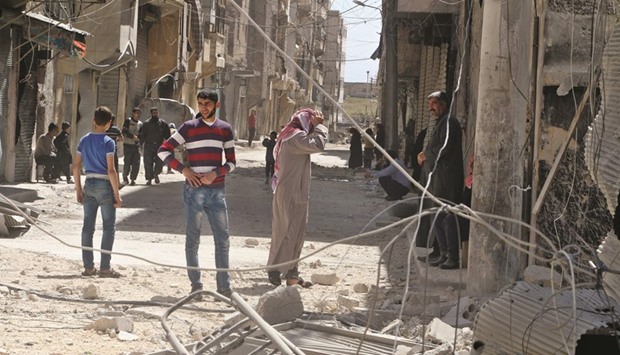The UN peace envoy to Syria said yesterday in Damascus that an upcoming round of negotiations in Geneva aimed at ending the country’s five-year war would be “crucially important”.
Staffan de Mistura’s comments came as offensives by Syria’s Al Qaeda affiliate and allied rebels triggered a spike in violence that could endanger the negotiations.
“The Geneva talks’ next phase are crucially important because we will be focusing in particular on the political transition, on governance and constitutional principles,” de Mistura told reporters after meeting Foreign Minister Walid Muallem.
“We hope and plan to make them constructive and we plan to make them concrete,” the envoy said.
Scheduled to resume tomorrow, the Geneva talks are aimed at ending a conflict that has killed more than 270,000 people and forced millions to flee their homes since it erupted in March 2011.
The UN Security Council passed a resolution in December that paved the way for the talks and called for elections in Syria to be held 18 months after a transitional government is agreed.
The fate of President Bashar al-Assad is a major sticking point, however.
While the opposition insists Assad can play no role in a future transitional government, the regime says voters should decide his fate.
The Syrian Observatory for Human Rights said yesterday that Al Nusra Front and allied militia were pressing offensives around northern, central and coastal Syria.
“Al Nusra and allied rebel groups are waging three synchronised offensives” on front lines in Aleppo, Hama and Latakia provinces, Observatory director Rami Abdel Rahman said.
So far, they have seized a hilltop in Latakia province, the heartland of Assad’s Alawite sect, the group said.
The Syrian army was yesterday reported to be sending reinforcements to Aleppo, where renewed fighting is threatening a fragile truce in the run-up to the next round of peace talks.
Underlining the conflict’s regional dimensions, Iranian media announced the first deaths of members of its regular army in Syria, a week after Tehran said army commandos had been deployed in support of Damascus. Iran’s military support has so far mostly been provided by the elite Revolutionary Guard Corps.
An eruption of fighting near the ancient city of Aleppo in the last two weeks marks the most serious challenge yet to a “cessation of hostilities” brokered by the US and Russia with the aim of facilitating peace talks.
Meanwhile, Russia said there were no plans to storm Aleppo despite thousands of Al Nusra militants massing around the city.
Sergei Rudskoy, head of the Russian General Staff’s main operations command, said around 9,500 Al Nusra fighters had gathered to the south-west and north of Aleppo and were planning a large-scale offensive to cut the city off from Damascus.
“All actions of the Syrian military and Russian air force are directed at disrupting the plans of Jabhat al-Nusra. No storming of the city of Aleppo is planned,” he said.

Residents inspect damages after an airstrike on the rebel held al-Maysar neighbourhood in Aleppo, Syria, yesterday.
